
Funded Experiments #2
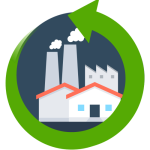
The second round of Experiments funded under the KYKLOS 4.0 project is under way. Within the KYKLOs 4.0 Open Call #2, seventeen projects were selected to carry out manufacturing experiments using the services and technologies from the KYKLOS 4.0 project.
The Experiments’ implementation started in January 2023 and will run for eight months, until the end of August 2023.
The funded Experiments involve SMEs and manufacturing companies from several European countries, including Italy, Spain, Portugal, Greece, France, Switzerland, Serbia, Germany, Belgium and Poland. These experiments will focus on key KYKLOS4.0 domains, including circular manufacturing deep learning, big data and data management, life cycle analysis, and cyber-physical systems.
Find out more about the funded experiments below.
ANATOLIA
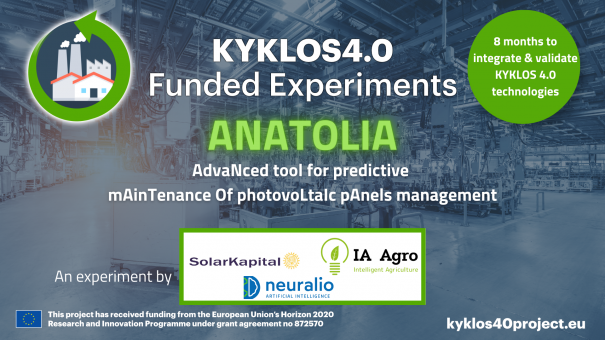
| Title |
|---|
| AdvaNced tool for predictive mAinTenance Of photovoLtaIc pAnels management |
| Acronym |
| ANATOLIA |
| Partners |
| NEURALIO AI P.C. (Greece), Solarkapital Asset Management Services LP (Greece), IA AGRO P.C. (Greece) |
| Target sub-domains |
| Predictive maintenance |
| Abstract |
| ANATOLIA is delivering a predictive maintenance tool consisting of a set of tools under one framework and building upon components of KYKLOS 4.0 circular economy services. To this end, ANATOLIA aims to facilitate energy efficiency, demonstrable at pilot areas (Photovoltaic plants) with clear circular economy indicators. It innovates not only by applying a high-resolution weather intelligence tool at the site location, but also by exploring satellite data to replace expensive on-site instruments while providing this information at a scenario in which plant operators are supported with a decision-support system (DSS). Predictive maintenance can help to anticipate failures and optimise maintenance interventions, which will result in an increase in the plant’s availability and performance. Anticipating failures will allow Operations & Maintenance (O&M) service providers to better manage and plan staff assignments, spare parts and replacements. Decreasing the number of unexpected failures reduces the cost of electricity, as it eliminates the need for backup reserves and it also contributes to a more stable grid. Developing ANATOLIA will allow these benefits, and the deployment of anomaly detection systems can help to close the gap between the current situation and the next generation of predictive maintenance systems. |
ARACOWELD
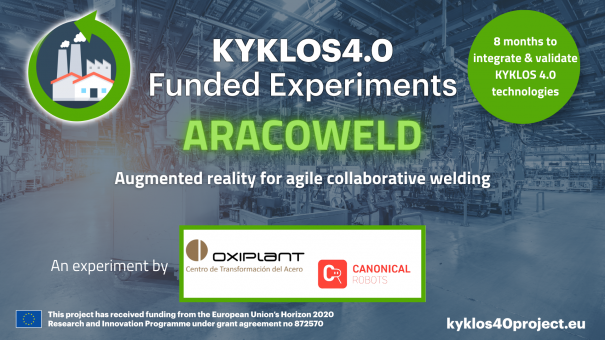
| Title |
|---|
| Augmented reality for agile collaborative welding |
| Acronym |
| ARACOWELD |
| Partners |
| Canonical Robots S.L. (Spain), Oxiplant (Spain) |
| Target sub-domains |
| AR-based guidance and monitoring for production |
| Abstract |
| The ARACOWELD experiment aims at providing modern capabilities to an automatic welding system to improve the human-machine interaction and contribute to the circular economy. The ARACOWELD lead partner, Canonical Robots, has an extensive experience working and developing solutions in the sector of robotic arc welding, using mostly collaborative robots. For the time being, it has focused on the more low-level aspects of the welding work flow. In the future, Canonical Robots will aim at increasing the company's portfolio by providing customers with a more holistic improvement of their daily operations. In this regard, the KYKLOS 4.0 ARACOWELD experiment represents a perfect opportunity for Canonical Robots to bring added value to customers by contributing to the circular economy of the automated welding industry. ARACOWELD aims to use KYKLOS 4.0 services to provide advanced support for production. More specifically, ARACOWELD will use augmented reality technology to allow features such as contextual or on-the-spot training, real-time operator machine/process monitoring, and simple operator task confirmations and malfunction reporting. The modular nature of ARACOWELD allows Canonical Robots to easily adapt the product to the concrete needs of manufacturing partners and also to move beyond the robotic arc welding environment to other related areas that represent a large market opportunity. |
ARETRO
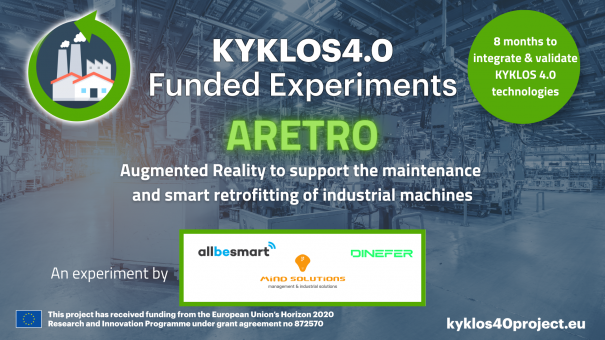
| Title |
|---|
| Augmented Reality to support the maintenance and smart retrofitting of industrial machines |
| Acronym |
| ARETRO |
| Partners |
| Allbesmart, LDA (Portugal), Dinefer - Engenharia e Sistemas Industriais SA (Portugal), MindSolutions-Industrial Solutions Lda (Portugal) |
| Target sub-domains |
| Reactive maintenance with AR based guidance |
| Abstract |
| In the EU, most of SMEs' manufacturing processes are usually based on specialized machines that have been in place for several decades. These machines were designed and built explicitly to produce specific products. Such machines simply cannot be replaced, from both economic and organizational perspectives, by modern cyber-physical systems. Indeed, in the real world, risks (and costs) associated with radical change are too high for SMEs. Older machines continue to be reliable and perform well for the required purposes. According to the European Re-manufacturing Network, re-manufactured machinery equals to 60 to 80% of the cost of a new machine, due to the savings made from the recovery of the materials. At the Human-Machine-Interface level, Augmented Reality (AR) is particularly suitable for retrofitting machines because an interface for any machine can be created independently of the hardware. It establishes a direct reference to the machine by placing 3D holograms with centimetre precision at the physical hardware itself. Thus, ARETRO will aim to demonstrate how retrofitting powered by new AR visualisation technologies can support knowledge-intensive production processes, giving a second life to legacy machines, and contributing to the Circular Economy paradigm. This project is perfectly aligned with the scope of KYKLOS 4.0, addressing the validation of circular manufacturing towards experimentation. |
ATILIUS
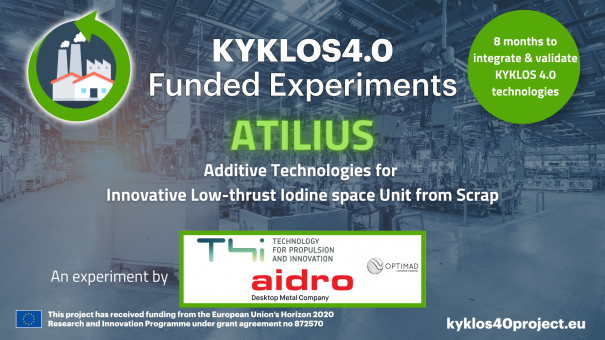
| Title |
|---|
| Additive Technologies for Innovative Low-thrust Iodine space Unit from Scrap |
| Acronym |
| ATILIUS |
| Partners |
| Technology for Propulsion and Innovation S.p.A. (Italy), Aidro S.r.l. (Italy), Optimad S.r.l. (Italy) |
| Target sub-domains |
| Optimization of Additive Manufacturing design |
| Abstract |
| ATILIUS is an innovative fluidic system for an electric space propulsion system for CubeSats that will reduce material consumption and waste on Earth and mitigate further pollution in space. The number of satellites around the Earth is increasing abruptly, exacerbating the space debris issue. The best solution to mitigate this threat is to de-orbit satellites at the end of their life, using propulsion systems for a controlled re-entry in the atmosphere. REGULUS-50-I2 is an electric propulsion system developed by T4i specifically for CubeSats, whose current fluidic subsystem design can be optimized to increase its thermal efficiency and allowing to store enough propellant for both standard orbital manoeuvres and de-orbiting. The only viable solution to fulfil the mass and volume constraints of these small satellites is to adopt Additive Manufacturing (AM) technologies to manufacture the fluidic system. The project aims to design, simulate, manufacture, test, and validate the fluidic subsystem, to be manufactured through metal 3D printing by using as raw material a “green powder”, i.e., a metal powder generated from scrap recycling. A numerical tool to improve the thermal efficiency of the system will be developed and validated during the project. ATILIUS represents a technological challenge and has a huge market potential. It will contribute to find solutions to open critical points along the AM process chain, while enabling de-orbiting of CubeSat missions |
CE4Con
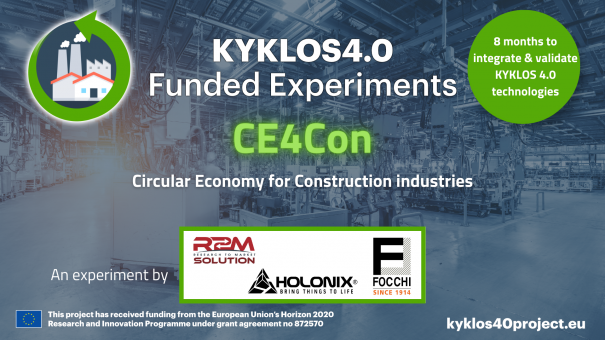
| Title |
|---|
| Circular Economy for Construction industries |
| Acronym |
| CE4Con |
| Partners |
| R2M Solution S.r.l. (Italy), Focchi S.p.A. (Italy), HOL S.r.l. (Italy) |
| Target sub-domains |
| Personalised product re-specification & refurbishment |
| Abstract |
| The objective of CE4Con is to develop a new range of services to support façade manufacturers in the building sector, which will subsequently be extended to all manufacturers of building envelope components, in the design and production of new items with recycled composite material. The services will be validated by a façade manufacturer to demonstrate that they can be adopted and create impact even in a poorly digitized industry such as construction. CE4Con is based on the ReUse platform, implemented by Holonix and further tested in the DigiPrime project, that enables the recycling of composite materials. The ReUse platform supports the whole value chain, creating a matchmaking between the demand for new materials and available offer of products to be recycled, while also informing about technical properties of the new materials and processes for the waste treatment. Besides, the AR-based R2M RIALTO solution will duly guide and support the operators during the dismantling, waste sorting and pre-treatment operations. CE4Con will be enriched by KYKLOS ecosystem: the purpose is a massive adoption of CE4Con able to produce a cascade of socio-economic benefit that will be focused on façade manufacturers. Furthermore, CE4Con will establish a business collaboration with MEZeroE and Metabuilding Labs platforms both already active in providing services to the construction sector. |
DLP4CME
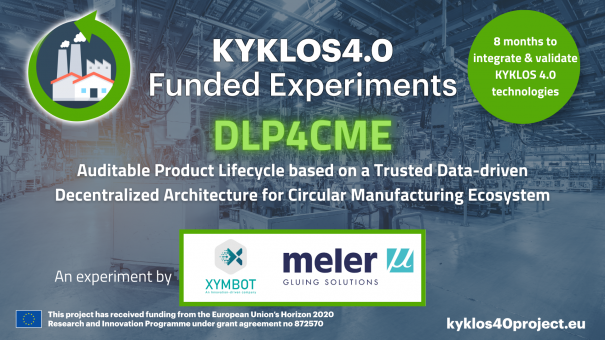
| Title |
|---|
| Auditable Product Lifecycle based on a Trusted Data-driven Decentralized Architecture for Circular Manufacturing Ecosystem |
| Acronym |
| DLP4CME |
| Partners |
| XYMBOT DIGITAL SOLUTIONS (Spain), FOCKE MELER GLUING SOLUTIONS (Spain) |
| Target sub-domains |
| Personalised product specification |
| Abstract |
| Digital Lifecycle Passport (DLP) technology is designed to provide end-to-end traceability, transparency, and trust of every manufactured product during its life cycle in an edge-based decentralized circular supply chain. Furthermore, DLP allows to build secure human-oriented data-driven analytics services on top (ground-to-cloud) of trusted data collected from a decentralized secure edge network deployed across the manufacturing supply chain. To accomplish the innovation, technological and business challenges identified in the current proposal, a consortium comprised of Xymbot Digital Solutions as a technology provider/system integrator and Focke Meler Gluing Systems as a manufacturing SME was built. Nowadays, MELER has more than 600 product references, offering stand alone products and a wide variety of special tailor-made projects for the hot-melt adhesives global market for several applications in cross-domain industrial, retail, healthcare and textile sectors. Thus, it is the ideal industrial scenario to deploy, test, and validate secure edge blockchain-based product digital lifecycle passport technology (TRL7 is expected). To achieve the project milestones, 3 wireless secure edges will be deployed; 17 Micron series products will be tested and 12 end-users will be assigned by MELER to validate the performance of multiplatform multi-labelling tracking, blockchain-based DLP and personalised visual analytics services designed, developed and deployed during the 8 months project execution. |
DYBLI-ML
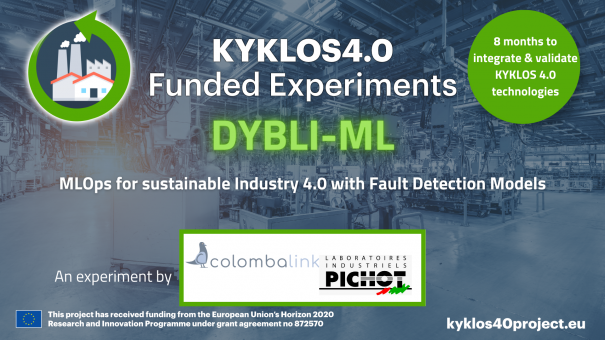
| Title |
|---|
| MLOps for sustainable Industry 4.0 with Fault Detection Models |
| Acronym |
| DYBLI-ML |
| Partners |
| Colomba Link GmbH (Switzerland), LABORATOIRES PICHOT (France) |
| Target sub-domains |
| Predictive maintenance |
| Abstract |
| The DYBLI-ML project, brings machine learning DevOps (MLOps) to the industrial sector in a user-friendly way by eliminating complexity. The main focus will be localized to fault detection of electric motors for large industrial production lines. Although the initial focus will be on electric motors, the long-term vision of the project is to create a user-friendly ML dashboard to enable technicians to monitor and predict failures. |
EasyPrint
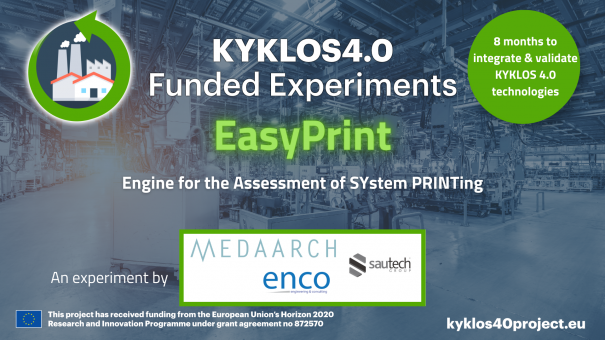
| Title |
|---|
| Engine for the Assessment of SYstem PRINTing |
| Acronym |
| EasyPrint |
| Partners |
| SAUTECH srl (Italy), MEDAARCH (Italy), ENCO srl (Italy) |
| Target sub-domains |
| Personalised product specification |
| Abstract |
| EasyPrint provides effortless smart design service to develop personalised products following an environmentally friendly process. Helping customers to provide the specific requirements for a customization and mass customization product, the platform allows 3D printing manufacturers to convert the requirements defined by the customer into individualised product specifications and to complete a customer-oriented design for additive manufacturing products. The use of non-petroleum-based materials will be supported using polymer-based materials. KYKLOS4.0 supports the creation of an innovative Circular Manufacturing ecosystem, increasing production efficiency; reducing waste and boosting the competitiveness of the EU manufacturing industries through the transformative effects that LCA; AI; PLM will have on the Circular Manufacturing sector. EasyPrint will achieve its impacts thanks to the services provided by the KYKLOS4.0 project. Within a period of 8 months, it will test and verify activities and technology components to contribute to the creation of a circular EU manufacturing system. |
ERMES
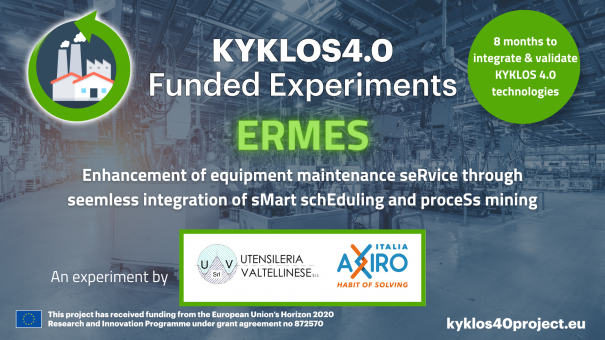
| Title |
|---|
| Enhancement of equipment maintenance seRvice through seemless integration of sMart schEduling and proceSs mining |
| Acronym |
| ERMES |
| Partners |
| AXIRO Italia Srl (Italy), UTENSILERIA VALTELLINESE Srl (Italy) |
| Target sub-domains |
| Predictive maintenance |
| Abstract |
| The objective of this experiment is to enhance and optimize Maintenance Service of production equipment/machine tools through seamless integration of AI-powered process mining techniques and smart scheduling. Process mining is the deep-dive analysis, discovery, monitoring and improvement of as-is processes, revealing the to-be efficiencies your business benefits from. It takes all of the process data within a company's walls and "mines" it for insight on potential improvement, focusing on finding better, more efficient pathways in operations. The goal is finding "touch-less" process paths that require minimal costs, resources and time. This allows businesses to increase speed and accuracy, allowing teams to focus on doing what they do best as efficiently as possible. On the other hand, Smart Scheduling, enabled by integration of KYKLOS 4.0 service ‘Predictive maintenance’ through the ‘Maintenance Scheduler’ component, supports the specialists in accomplishing their mission of maintaining the fixed means of equipment (machines, installations, equipment) in working condition, at their nominal parameters and in safe conditions, throughout the duration their living, with minimal costs and without affecting the production. Maintenance Scheduler aims to schedule the workloads on the equipment, without affecting the production time. |
MaChAwAI
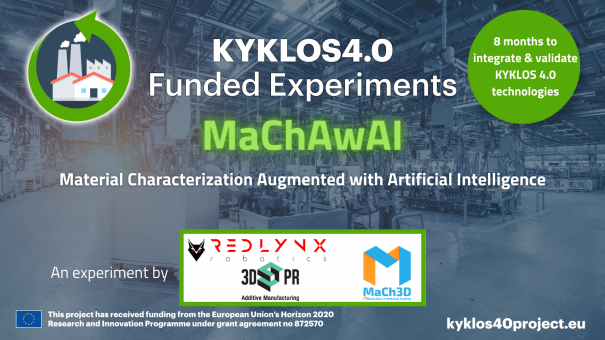
| Title |
|---|
| Material Characterization Augmented with Artificial Intelligence |
| Acronym |
| MaChAwAI |
| Partners |
| MaCh3D Srl (Italy), RedLynx Robotics Srl (Italy), 3DPR Srl (Italy) |
| Target sub-domains |
| Optimization of Additive Manufacturing design |
| Abstract |
| The project MaChAwAI aims to develop an improved material testing procedure, augmented with artificial intelligence, and integrated with the testing machine MaCh3D, a miniaturised universal tensile testing instrument. By implementing material testing directly in the industrial production areas of 3DPR, a production company specialised in additive manufacturing, it will be easier and faster to control the quality and mechanical characteristics of the material being processed, with a positive impact on the life cycle and duration of the final products. |
MainSol
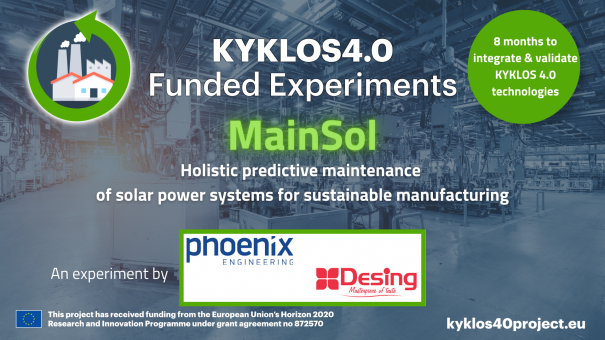
| Title |
|---|
| Holistic predictive maintenance of solar power systems for sustainable manufacturing |
| Acronym |
| MainSol |
| Partners |
| PHOENIX (Serbia), DESING (Serbia) |
| Target sub-domains |
| Predictive maintenance |
| Abstract |
| MainSol's vision is to create a new generation of predictive maintenance solutions for mid-sized solar power plants that use advanced artificial intelligence and data analytics methods to predict/analyze not only trends in solar energy generated, but also the state of the entire solar and manufacturing infrastructure, enabling holistic predictive maintenance. Manufacturing SME (DESIGN) has installed a mid-size Polar power system and Technology provider (PHOENIX) is provider of such solutions. Therefore, there is a huge motivation of participating SMEs for the planned work. Main innovation is on the modelling part where the behaviour of the infrastructure should be modelled in a very robust and accurate manner, due to the complexity of the infrastructure and the need to react very promptly (based on predictions). This enables to go beyond the traditional approaches for the estimation of the Remaining Useful Life (RUL) of machine assets (RUL is an essential part of predictive maintenance). Indeed, this approach models the normal behaviour of the asset (infrastructure) using advanced analytics combining KYKLOS 4.0 services for predictive maintenance and the existing solutions for advanced modelling by the technology provider. MainSol will contribute to the objective of validation in real world scenarios the KYKLOS 4.0’s value proposition: manufacturing-driven services and digital components to increase manufacturing circularity and production efficiency. |
POET4POEM
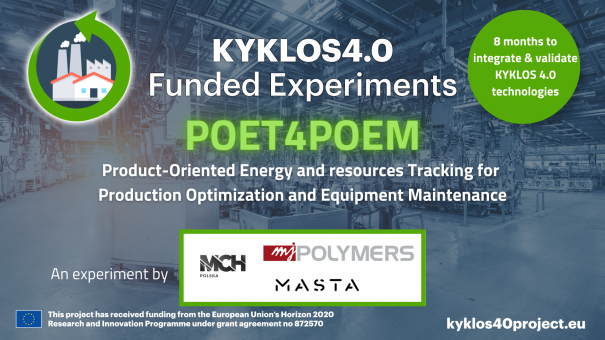
| Title |
|---|
| Product-Oriented Energy and resources Tracking for Production Optimization and Equipment Maintenance |
| Acronym |
| POET4POEM |
| Partners |
| MASTA SOLUTIONS Sp. z o. o. (Poland), MCH POLSKA IWONA KOSCIUSZKO (Poland), MICHAŁ JANIEC MJ POLYMERS (Poland) |
| Target sub-domains |
| Monitoring and resource optimization with DS |
| Abstract |
| The POET4POEM project addresses two main challenges of the circularity in high-mix, low-volume manufacturing – optimization of the energy consumption in individual production steps as well as tracking and reusing the generated scrap. Embracing such a circular approach, it will help manufacturing companies in reducing the environmental footprint of their operation while also offering economic benefits. The project will integrate selected existing services of KYKLOS4.0 with the existing MASTA solution – a Software-as-a-Service platform offering digitalization of manufacturing management. It will also develop prototypes of pluggable energy consumption sensors for legacy machines and new software components enhancing the MASTA platform. The resulting system will offer a number of circularity-driven services: – Insights into energy and resources consumption and rate of scrap generation from different perspectives – product-, production-step-, energy-, resources- and scrap-centric one. This will involve both analysis of historic data as well as real time dashboards. – Support in planning and scheduling facilitating energy savings and use of the available scrap. – Energy, resources and quality anomaly detection for predictive maintenance of machines. The system will be deployed and validated with two manufacturing pilots representing different domains – metal fabrication and injection moulding. |
PUMP
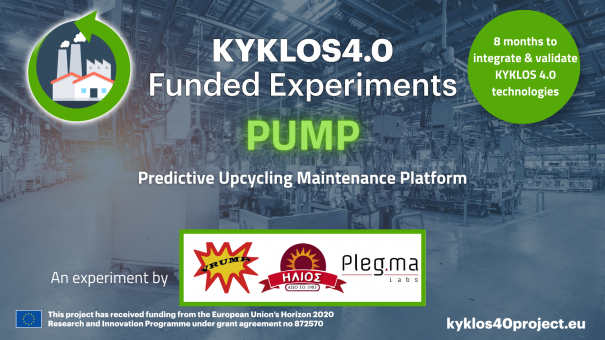
| Title |
|---|
| Predictive Upcycling Maintenance Platform |
| Acronym |
| PUMP |
| Partners |
| VRUMP Industrial IoT Solutions (Greece), PLEGMA LABS S.A. (Greece), HELIOS BAKERY (P&E TAKOUDIS - PSKAFIDAS O.E.) (Greece) |
| Target sub-domains |
| Predictive maintenance |
| Abstract |
| The PUMP project will apply existing non-intrusive energy monitoring tools and advanced ML models to analyse the patterns in electrical loads of machinery equipment, disaggregate component loads, and detect deviations from normal operation in a food processing plant. The project will use the services and technologies of KYKLOS 4.0 project for production optimization; PUMP focuses on Predictive maintenance and will harness the holistic approach of KYKLOS 4.0 to offer enhanced features through the collaborative platform. Data collected from the factory shop-floor regarding the production process, energy consumption and environmental parameters will be used alongside the technologies of the industrial partners and services of KYKLOS 4.0 platform. Services such as Semantic Knowledge Base and Production Equipment Clustering will be fused with energy disaggregation and energy analytics to support energy efficiency and efficient machinery health monitoring (MhM). LCA simulations engine will support process efficiency and reduction of waste and the Decision Support System will enable the seamless integration of the various components outputs to derive towards targeted actions. PUMP will utilize various KYKLOS 4.0 services and features and enhance already developed tools to tackle the problem by combining the outputs of these tools with the DSS system of KYKLOS 4.0. |
RoboWeldAR
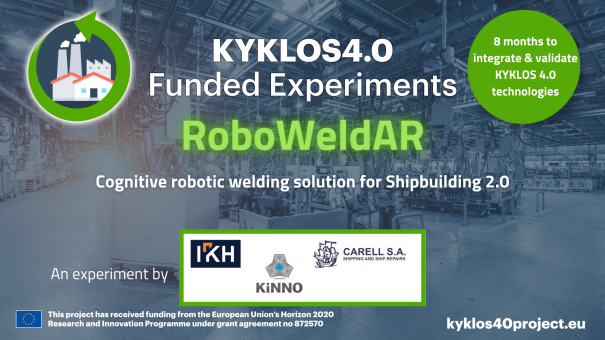
| Title |
|---|
| Cognitive robotic welding solution for Shipbuilding 2.0 |
| Acronym |
| RoboWeldAR |
| Partners |
| IKnowHow SA (Greece), Carell SA (Greece), KiNNO Consultants (Greece) |
| Target sub-domains |
| AR-based guidance and monitoring for production |
| Abstract |
| RoboWeldAR is an innovative, self-navigating robotic welding solution that will revolutionize the ship new-building and repair industry (Shipbuilding 2.0). The proposed solution yields reduction in manufacturing costs for shipbuilders, increases worker safety by preventing their exposure to harmful optical radiation and toxic fumes, as also enhances circularity in welding activities through CO2 emissions reduction, final product’s lifespan rise and material usage minimization by consistently using the correct welding settings. The main goal is to deliver a robotic welding system which will automate highly custom tasks in agnostic and ever changing environments, such as shipbuilding and repair operations in the shipping industry, by performing high quality and safe welding tasks, while providing technicians with the ability to monitor and easily insert custom welding trajectories. The solution is based on a robotic arm equipped with a welding kit, a 3D scanner, and a laser seam tracker. An AR HMD together with a DSS are used to control and monitor the robot, as well as enhance human-robot collaboration. RoboWeldAR is designed to bridge the gap between the human-operators and robot-machines; also enabling those who are not familiar with the technology and process, towards modernizing laborious, dangerous jobs, while raising the efficiency and competitiveness of the shipbuilding and repair industry through the economic, social, environmental benefits the solution creates. |
ROCTex
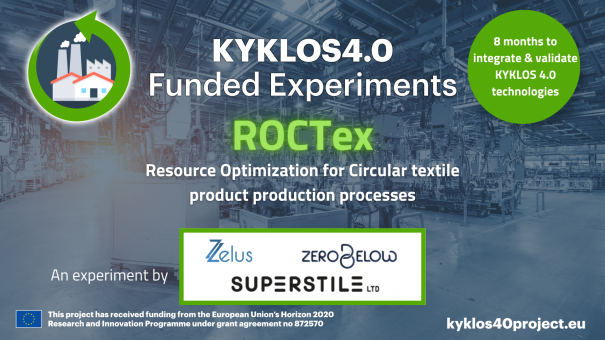
| Title |
|---|
| Resource Optimization for Circular textile product production processes |
| Acronym |
| ROCTex |
| Partners |
| Zelus PC (Greece), ZeroBelow (Germany), SUPERSTILE LTD (Italy) |
| Target sub-domains |
| Monitoring and resource optimization with DS |
| Abstract |
| Textiles are used in almost all aspects of our everyday lives with apparel being usually the first to come in mind. It also comes first in numbers with clothing representing the 81% of textile consumption in Europe, comprising more than 60.000 companies (mostly small and medium-sized) and employing more 1.5 million people. The need for the implementation of automated technologies and digitalization of processes in order to improve efficiency, product quality and flexibility is imminent. ROCTex goal is the development of a digital solution which enables textile producers to accelerate the adoption of technological innovation in order to increase their energy efficiency and their agility, to reduce their waste during the product design and production processes, and to allow the building or enriching of digital product passports that will help researchers come up with innovative solutions for making the textile manufacturing circular. Such a solution would come at a perfect timing for companies who are currently being prepared (and forced) to address the requirements of the EU Strategy for sustainable and circular textiles. |
SMARTER-MAN
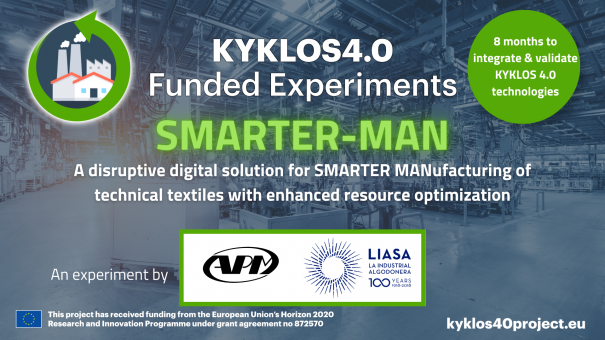
| Title |
|---|
| A disruptive digital solution for SMARTER MANufacturing of technical textiles with enhanced resource optimization |
| Acronym |
| SMARTER-MAN |
| Partners |
| APM Comercial Informàtica S.A. (Spain), LA INDUSTRIAL ALGODONERA, S.A. (Spain) |
| Target sub-domains |
| Real-time monitoring and resource optimization with VPLO |
| Abstract |
| La Industrial Algodonera S.A. (LIASA) is a leading Spanish textile company established in 1918 that manufactures cords, elastic cords and polypropylene yarns for a wide range of applications - from packaging, outdoor furniture, agriculture, to graphic arts and footwear. The current manufacturing processes in LIASA are largely dependent on manual tracking, quality control and inspection at different stages within the production. Concerning the KYKLOS 4.0 project, LIASA is mostly interested in the implementation of an Industrial 4.0 solution to increase the efficiency of the manufacturing of elastic cords targeted to the agrotextile sector – aimed to hold and protect fruits trees and crops from adverse climate conditions. In order to digitize and automate its manufacturing processes, LIASA is partnering with the technology provider APM, a company with vast expertise in developing and integrating game-changing industrial 4.0 solutions such as IoT sensors and ERP systems to monitor the production of its assets. The proposed solution consists in a disruptive digital industry 4.0 solution for smarter manufacturing of elastic cords and will bring major benefits to LIASA and its potential customers. Such array of benefits include: reduced machine downtime with improved asset utilization, less waste generated and lower manufacturing labour costs, and ultimately an improved product quality leading to greater customer satisfaction and increased profits. |
VirtFuse
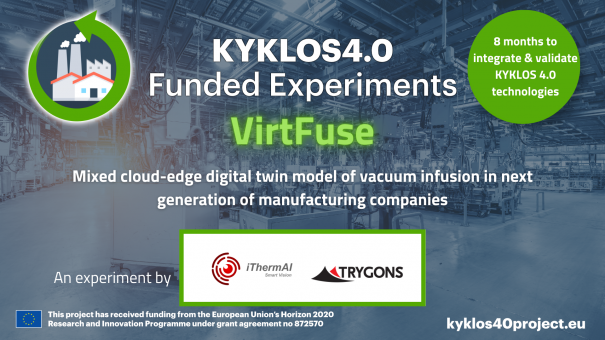
| Title |
|---|
| Smart circular-compliant Vacuum infusion in Industry 4.0: Mixed cloud-edge digital twin model of vacuum infusion in next generation of manufacturing companies |
| Acronym |
| VirtFuse |
| Partners |
| iThermAI B.V. (Belgium), Trygons SA (Greece) |
| Target sub-domains |
| Reactive maintenance with AR based guidance |
| Abstract |
| Vacuum infusion process (VIP) is a widely employed low-cost additive manufacturing process for the production of large composite parts. Mid-size to large yachts, automobile cabins, and blades of wind turbines are examples of VIP. The global Glass Fiber Reinforced Plastics (GFRP) composites market, which is mainly based on using VIP, was projected to grow at a CAGR of 6.4% from USD 43.93 billion in 2017 to USD 59.87 billion by 2022. VIP is a circular economy compliant process given its relatively low waste generation and clean operation. However, these advantages hold as long as the parameters of the VIP are continuously set correctly and accurately in uncontrolled environments. It is relatively easy to render a part defective by using inaccurate resin mixtures or unpredictable environmental parameter changes. VirtFuse is a digital twin model of the vacuum infusion equipment. VirtFuse employs measurements generated by temperature sensors, resin curing sensor, as well as RGBT (RGB+Thermal) video cameras which monitor the infusion process in real-time. The model is trained using an AI-based bootstrap learning approach to minimize the dataset generation auditing phase. An AR dashboard is developed to visualize the multidimensional data of the process to the responsible operator in real-time in order to allow monitoring the spread, curing level, as well as possible defects. Such data enables the operator to stop the process and limit waste in case a defect develops. |

